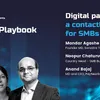Digital Playbook for SMBs: How small businesses and MSMEs can adopt digital accounting solutions
On SMBStory’s Digital Playbook for SMBs video series, Tejas Goenka from Tally Solutions and Sumit Agarwal from Vyapar come together to discuss how digital accounting solutions boost financial literacy of traditionally-run small businesses and MSMEs.
The number of MSMEs in India is one of the largest in the world. According to official estimates, India’s MSME sector comprises 633.88 lakh units that create employment opportunities for around 1109.09 lakh people.
Even though these businesses are the backbone of the Indian economy contributing to 37.54 percent of the Indian GDP, the sector falls behind the disrupting startup ecosystem that solves ground-level problems with tech-based solutions.
MSMEs follow the traditional route in running their business operations that rely on manual work for all the processes especially accounting.
In times of COVID-19, when digital solutions are helping businesses run across the world, the traditional-run MSME sector is going through a tough time. Thus, it is imperative now that MSMEs adopt digitisation not only to survive but also to thrive in a post COVID world.
On SMBStory’s Digital Playbook for SMBs, Tejas Goenka from Tally Solutions, one of India’s biggest Enterprise Resource Planning company, and Sumit Agarwal from Vyapar came together to talk about the dire need of the digital accounting solutions and how small and medium businesses can avail benefits of the same.
SME entrepreneur Bhavin Bharadwaj also joined the session to talk about the challenges and struggles of the sector in adopting digital solutions.
Watch the full interview here.
Here are excerpts of the conversation:
Outsourced VS digital accounting solution
For decades, MSMEs have been following the traditional route of outsourcing to financial firms, hiring CAs for their account entries, and sometimes even managing their accounts on their own. They feel more confident when they have direct control of the operations, and often undermine or are skeptical of adopting digital solutions.
However, with the burden of managing expenses, payment cycle, keeping a track of stock, tax, GST, and more, it poses a challenge to manage everything manually. As a result, it often leads to wrong entries resulting in recurring losses.
Tejas Goenka says, “Indian business entrepreneurs are wise. If you see, they have been doing manual work for years and surviving the business. With Tally, we are here to support and improve their experience. We aim to help them access critical business data without any hassle and worry.”
Digital education is a must
The biggest challenge in adopting digital solutions is the lack of awareness and digital education.
SME entrepreneur Bhavin Bharadwaj says that he opted for a digital accounting solution four years ago. Before that he was handling his accounts manually. After switching to the digital accounting process, he is able to focus on other areas of the business rather than just spending hours in book-keeping and keeping track of the inventory.
“Technology usually scares small business owners who need hand holding to go the digital way,” says Sumit Agarwal, Founder of .
“SMEs are afraid of handling their accounts digitally. They fear breaching confidential data, handling the software, and other things that require training and lessons,” he adds.
To help businesses adopt digital solutions, imparting them training and hand holding them through the system is essential.
Simplicity is the key
Having a simple digital accounting solution to everyday problems of SMBs will enable them to transform digitally. It is important that product builders build a simple product to help local businesses boost their financial literacy and survive the cut-throat market competition.
The session also unveiled the price points of a digital solution, challenges, and difficulties in using a digital solution, and the golden rules to keep in mind for entrepreneurs while selecting a digital accounting software.
Edited by Dipti D









